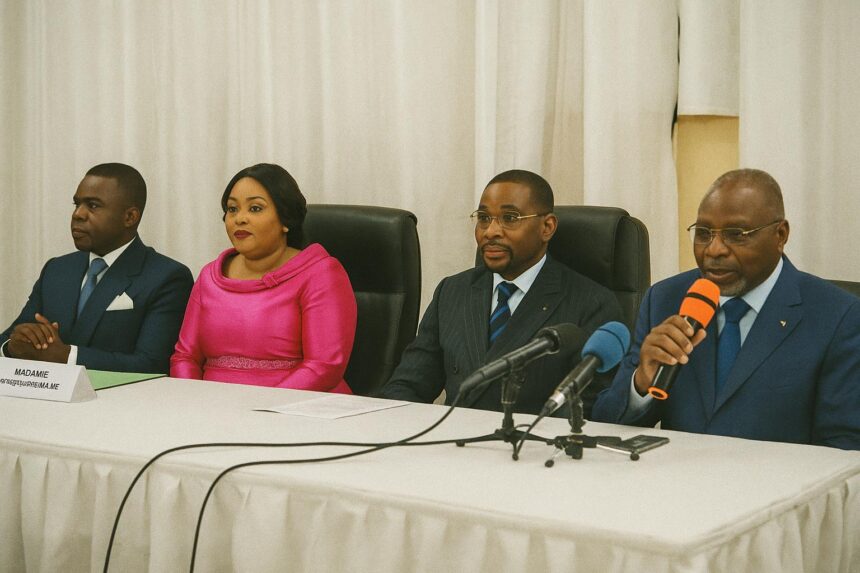A Historic Appointment in Brazzaville’s Heart
The modest inauguration hall in Brazzaville’s fifth arrondissement, Ouenzé, rarely draws the attention of regional chancelleries. Yet on 14 July it became the focus of discreet diplomatic cables after Grace Steph Antonétie Ivosso, an economist by training and veteran civil servant, was acclaimed as the first woman to hold the mayoral chain in the district’s post-independence history. Local residents lined the avenue in a display of civic warmth that, observers noted, transcended partisan affinities. The scene, carried live on national television, echoed the government’s stated pledge to deepen administrative proximity to citizens while promoting female leadership.
- A Historic Appointment in Brazzaville’s Heart
- Congo’s Decentralisation Agenda Gains Texture
- Gender Dynamics and Emerging Leadership
- Operational Challenges Facing Ouenzé Municipality
- Alignment with National Development Frameworks
- Diplomatic Significance of Local Governance Evolution
- Prospects Under Mayor Ivosso’s Mandate
Congo’s Decentralisation Agenda Gains Texture
Since the 2003 constitutional amendments that broadened municipal prerogatives, Brazzaville has sought to convert decentralisation from a legislative aspiration into an operational reality. The Ministry of Local Development reports that 46 percent of municipal budgets are now executed at the arrondissement level, up from 28 percent a decade ago (Ministry communiqué, June 2024). The elevation of Mayor Ivosso, previously Secretary-General of Mfilou-Ngamaba city hall, is therefore not an isolated gesture but the latest manifestation of a calibrated policy to professionalise local administration. Analysts at the Congo-Brazzaville Governance Observatory suggest the move may accelerate the rollout of performance-based grants negotiated with the World Bank in 2021 for urban infrastructure upgrades.
Gender Dynamics and Emerging Leadership
Women presently occupy just 18 percent of executive municipal posts nationwide, a figure the National Gender Council aims to raise to 30 percent by 2027 (UNDP Annual Review 2023). Mayor Ivosso’s ascendancy supplies an instructive benchmark. In her first public address she committed to an “inclusive, inter-generational compact” and promised to assemble a consultative forum of youth and women’s associations within ninety days. For the diplomatic community monitoring Sustainable Development Goal 5 implementation, Ouenzé now offers a micro-laboratory to appraise how normative commitments translate into budget lines and service delivery.
Operational Challenges Facing Ouenzé Municipality
Ouenzé’s administrative ledger lists 136 staff, of whom 56 are municipal functionaries and 80 are seconded from the central ministries. That bifurcated structure, while intended to ensure technical support, has sometimes produced coordination gaps in waste management and land registry processing, according to a 2022 audit by the African Development Bank. Mayor Ivosso inherits an annual operating budget of roughly 1.8 billion CFA francs, 60 percent of which is pre-committed to salaries. Her success will hinge on mobilising additional own-source revenues without burdening the largely informal local tax base. Early signals—such as her directive to digitise market stall fees—suggest a pragmatic approach rather than sweeping fiscal experimentation.
Alignment with National Development Frameworks
The Plan National de Développement 2022-2026 emphasises urban resilience, youth employment and public-private partnerships. Senior officials, including Minister of Urban Sanitation Juste Désiré Mondélé, underscored during the ceremony that Ouenzé’s municipal priorities must dovetail with those national pillars. In practice this means synchronising street-lighting projects with the Energy for All programme and channelling sports-ground rehabilitation through the Presidential Initiative on Youth Empowerment. Such vertical policy coherence is integral to Congo-Brazzaville’s negotiations for concessional climate financing, a point envoys from the European Union discreetly reiterated to municipal officers after the installation, according to a diplomatic memo reviewed by this publication.
Diplomatic Significance of Local Governance Evolution
Foreign missions in Brazzaville are increasingly alert to sub-national politics as a barometer of stability. As one Central African diplomat put it, “A mayoralty capable of delivering services is worth a battalion of peacekeepers.” The peaceful, cross-party endorsement of Mayor Ivosso therefore feeds into a broader regional narrative that positions Congo-Brazzaville as a constructive actor in Central Africa’s security architecture. It also offers reassurance to investors assessing municipal capacity to manage public-private concessions in drainage, housing and cultural tourism.
Prospects Under Mayor Ivosso’s Mandate
Measured optimism characterises most expert assessments. The Congolese Institute for Economic Reform projects that disciplined collection of local tariffs combined with targeted infrastructure co-financing could lift Ouenzé’s capital expenditure by 25 percent over the next three years. Much will depend on the mayor’s ability to preserve the spirit of non-partisan collaboration articulated during her swearing-in. For now, residents appear to share a forward-looking sentiment, encapsulated by a market vendor who remarked, “If she keeps the streets clean and lights on, politics will take care of itself.” Such pragmatic expectations may prove the most reliable catalyst for success.




















